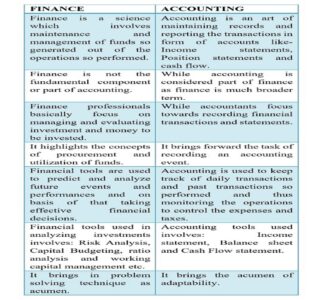How can we differentiate Finance from Accounting?
Are these two terms similar ? People consider both these concepts similar but this is not the case as both of the terms are interlinked up to some extent but both of these concepts at time of applicability requires different skills and professional personnel to deal with. Let’s discuss these concepts to clear ambiguity that exist in our mind with respect to these terms.
Finance
Finance is a broader term used to associate different terms like banking, money market, capital market, leverages and debt etc. It is considered as life blood of business as it funds the business activities, carrying out purchases, or investing out funds into different financial securities or assets. A term which involves the process of analyzing and managing the money, studying and evaluating the ways and methods to utilize the money productively. People raise money or capital either to fund their expenditures or business activities to generate income out of it instead. The primary financial concepts are all based on micro and macro economics. It even involves the concept of studying the money and derivative market to understand the flow of funds in the economy. One can divide the concept of finance into 3 broad categories namely:
• Public finance- It describes the role of government in the economy. It is a term which linked with the concepts of tax systems, government deficit or expenses, debt issues with other concerns. There need to make adjustments to the government revenue and expenditure so generated to bring adjustments and come up with desirable and effective results with respect to allocation of resources, equiable distribution of income among people and bring stability in the economy.
• Corporate finance- it involves the process of evaluation and management of assets, liabilities, expenditures and income respectively. It includes responsibility of the managers try to increase the valuation of firm to enhance shareholders contribution. The utmost aim is to increase shareholder’s value. It involves primarily two disciplines: Capital Budgeting and Working Capital.
Capital Budgeting involves which project need to be funded through debt or equity.
Working Capital means to make a decision about how much amount of funds are needed for day-to-day operations and how to manage short-term assets respectively.
• Personal finance- it deals with the concept where an individual processes all the information before taking any financial decision like budgeting, savings, borrowing and retirement planning. Individual plans to spend their monetary expenses by keeping in view various financial contingency and future events. People to save them from insolvency at time of emergency invest under different financial instruments like- saving accounts, fixed accounts, mutual funds, corporate shares and bonds, life insurance, health insurance and other government schemes introduced by government authorities.
Accounting
Accounting is a procedure to maintain record of financial transactions after proper calculation and evaluation in form of financial statements. It helps in summarizing the transactions so performed during an accounting period reflecting company’s financial position, income statements and cash flow statements. The records so maintained are not only used for future references but also presented to different agencies, regulators to keep a check whether the statements are prepared as per norms of Accounting Standards and stakeholders of the company to view whether to invest in the company or not. Accounting can be categorized ahead in various fields:
• Financial accounting
• Management accounting
• Cost accounting
The most common system used to keep record of financial transactions so incurred during an accounting year is double-entry bookkeeping method.
The principle used to regulate accounting statements by auditing firms include- Generally Accepted Accounting Principles (GAAP).
Distinguish between Finance and Accounting
Somewhere both the terms of accounting and finance seems to lie in a same flask but both the terms hold a unique identity and significance when it comes to take financial decisions.
Why entrepreneurs need to be equipped not only about the accounting concepts alone but also about the financial theories and tools?
– A business owner is a one who is considered responsible with respect to taking smarter and good investment decisions by understanding the financial statements well getting the wider picture of the business. If a business owner feels that having the understanding with respect to accounting statements alone would help one to run their business successfully, then it’s not so. Every business owner need to undertake and understand different financial concepts and strategies which would not only bring profits to the business but also enables one to take good investment decisions. As every business need adequate finances to launch projects and thrive to grow their business it can be done only if business owners know well about advantages and disadvantages of investment options like- debentures, loans etc.
When business owners understand the fundamentals of financial tools it helps them to formulate the overall strategy and enables them to balance long-term investments with making quarterly budget decisions. Financial literacy is a route to profitability and upgrading the scale of business. It enables entrepreneurs to control cost and in case of downfall bring out small chances of survival as well. If business owners acquire financial literacy as well then it brings integrity in business with grabbing good accounting concepts along with saving both time and money.
Conclusion– Financial literacy is just like gross profit to the enterprise if it is acquired by the business owners. While financial literacy should also be given to employees as well to improve their level of decision making in their personal life and corporate life as well. As new financial products and services have entered the market and as the market is becoming more financially complex there arises the need of financial literacy.


